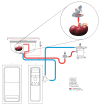Additional Normothermic Machine Perfusion Versus Hypothermic Machine Perfusion in Suboptimal Donor Kidney Transplantation: Protocol of a Randomized, Controlled, Open-Label Trial
- PMID: 34708171
- PMCID: PMC8499718
- DOI: 10.29337/ijsp.165
Additional Normothermic Machine Perfusion Versus Hypothermic Machine Perfusion in Suboptimal Donor Kidney Transplantation: Protocol of a Randomized, Controlled, Open-Label Trial
Abstract
Introduction: Ageing of the general population has led to an increase in the use of suboptimal kidneys from expanded criteria donation after brain death (ECD-DBD) and donation after circulatory death (DCD) donors. However, these kidneys have inferior graft outcomes and lower rates of immediate function. Normothermic machine perfusion (NMP) may improve outcomes of these suboptimal donor kidneys. Previous non-randomized studies have shown the safety of this technique and suggested its efficacy in improving the proportion of immediate functioning kidneys compared to static cold storage (SCS). However, its additional value to hypothermic machine perfusion (HMP), which has already been proved superior to SCS, has not yet been established.
Methods and analysis: This single-center, open-label, randomized controlled trial aims to assess immediate kidney function after 120 minutes additional, end-ischemic NMP compared to HMP alone. Immediate kidney function is defined as no dialysis treatment in the first week after transplant. Eighty recipients on dialysis at the time of transplant who receive an ECD-DBD or DCD kidney graft are eligible for inclusion. In the NMP group, the donor kidney is taken of HMP upon arrival in the recipient hospital and thereafter put on NMP for 120 minutes at 37 degrees Celsius followed by transplantation. In the control group, donor kidneys stay on HMP until transplantation. The primary outcome is immediate kidney function.
Ethics and dissemination: The protocol has been approved by the Medical Ethical Committee of Erasmus Medical Center (2020-0366). Results of this study will be submitted to peer-reviewed journals.
Registration: registered in clinicaltrials.gov (NCT04882254).
Highlights: This is the first RCT to compare additional NMP to HMP alone.Extensive sampling will offer in-depth analysis of kidney physiology during NMP.This RCT may help identify biomarkers to predict clinical outcomes during NMP.Biomarkers can help develop NMP as assessment tool for declined kidneys.
Keywords: Kidney transplantation; Organ preservation/methods; perfusion; randomized controlled trial.
Copyright: © 2021 The Author(s).
Conflict of interest statement
The authors have no competing interests to declare.
Figures
References
-
- Eurotransplant. statistics.eurotransplant.org: 7090P_All ET_kidney: 13.June.2019: 10-01-2019.
-
- Schaapherder A, Wijermars LGM, de Vries DK, de Vries APJ, Bemelman FJ, van de Wetering J, et al. Equivalent Long-term Transplantation Outcomes for Kidneys Donated After Brain Death and Cardiac Death: Conclusions From a Nationwide Evaluation. EClinicalMedicine. 2018; 4–5: 25–31. DOI: 10.1016/j.eclinm.2018.09.007 - DOI - PMC - PubMed
Associated data
LinkOut - more resources
Full Text Sources
Medical



